April 15, 2025 | 01:55 GMT +7
April 15, 2025 | 01:55 GMT +7
Hotline: 0913.378.918
April 15, 2025 | 01:55 GMT +7
Hotline: 0913.378.918
Hai Phong city currently oversees more than 1,268 hectares of organic rice, vegetable and fruit production, including over 40 hectares of organic-certified production areas. Namely, the certified production areas primarily include the rice-frog farming system in the communes of Ngu Phuc, Ngu Doan, and Kien Quoc in Kien Thuy district, and several communes in Tien Lang district. Moreover, the certified organic production of rice, vegetable and fruit accounts for a relatively small total area within the city.
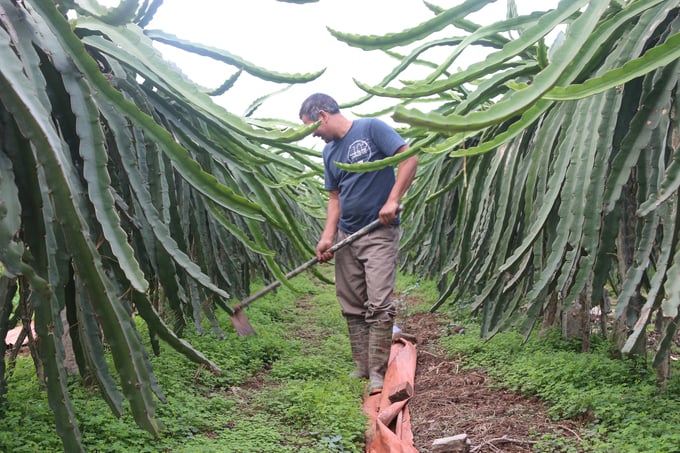
Organic dragon fruit production in Bat Trang commune, An Lao district, Hai Phong City. Photo: Dinh Muoi.
Organic agricultural production not only generates high-quality and safe products but also ensures ecological balance, prevents environmental pollution, and mitigates the adverse impacts of chemical ]and pesticide abuse. Despite the relatively high farmers' awareness regarding organic production, engaging in organic or organic-oriented production remains a challenging prospect due to several factors.
Mr. Nguyen Van Truong, Director of Truc Trang Organic Cooperative in Bat Trang commune, An Lao district, Hai Phong City, shared: "The cooperative has produced 50 hectares of organic dragon fruit for over ten years. Organic production practices have led to strong plant health, excellent disease resistance, and a more flavorful fruit. As a result, the cooperative's organic fruits have gained popularity in the market, thereby ensuring a stable income for local farmers. On average, every 360-square-meter plot of dragon fruit yields an annual profit of nearly 25 million Vietnamese dong. This figure is dependent on the farm's age and the production practices of each household."
After attending training sessions and recognizing the value of organic production throughout the process, members of the cooperative have committed to strictly adhere to the production process with the aim of being certified as an organic production area. However, this endeavor has faced numerous challenges due to the rigorous criteria and stringent standards.
Furthermore, there is a marginal difference between the selling prices of dragon fruit from organic production households and those from traditional production households. Consequently, many farmers are reluctant to transition from traditional farming methods to organic production.
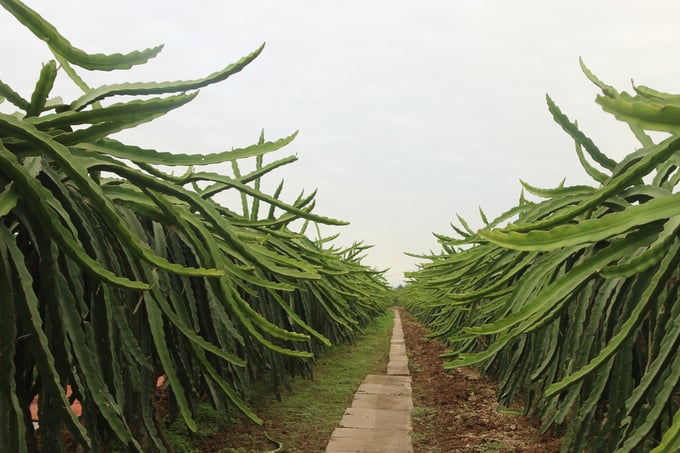
Dragon fruit farmers in Bat Trang commune is struggling to transition to organic production. Photo: Dinh Muoi.
"The difficulties and challenges originate from the farmers. Households within the cooperative generally support the transition to organic production. However, factors such as soil fertility, land, water sources, and buffer zones have posed numerous difficulties in the implementation process. Moreover, transitioning to organic production will result in an unavoidable decrease in productivity during the initial stages. It takes at least three to four years for new crop yields to recover, so farmers are unwilling to make such sacrifices," shared Mr. Truong.
According to Mr. Truong, the cooperative must meet various criteria concerning soil, water, chemical residue, and pesticides in order to be officially recognized as an organic production area. However, the local agricultural production area was subjected to the use of pesticides for flower cultivation in the last few years, which further compounded the challenges.
"We must meet strict requirements to acquire organic certification. We have invited specialists to assess and evaluate but our 50-hectare dragon fruit production area is relatively fragmented. Excluding the buffer zone of approximately 10 hectares, the actual area eligible for organic certification is considerably reduced, leaving local farmers disinterested," Mr. Truong added.
Thuy Huong Agricultural Business and Services Cooperative was recently certified for an organic rice production area spanning 15 hectares in Ngu Phuc Commune, Kien Thuy District, Hai Phong city. Ms. Nguyen Thi Ha, Director of Thuy Huong cooperative, stated: "The cooperative manages over 200 hectares of rice fields, but we have only achieved organic certification for 15 hectares in Ngu Phuc Commune. The most significant challenge in obtaining organic certification is the high costs. Based on our calculations, the total expenses incurred to meet organic standards amount to nearly 100 million Vietnamese dong."

Ms. Nguyen Thi Ha (far left) visiting an agricultural production model in Hai Phong city with local officials. Photo: Dinh Muoi.
"From an economic standpoint, local organic rice production has not achieved significant results. Even after acquiring organic certification for rice production, the selling price and consumption levels of local rice products remain unchanged, without substantial differences. We manage over 200 hectares of rice fields in the tidal zone, but expanding the certified organic rice production poses an immensely challenging task," added Ms. Ha.
The narratives of Ms. Ha and Mr. Truong reflect the prevailing situation of organic production in Hai Phong city, which is a widespread reality hindering the expansion of organic agricultural production in various regions across the country.
On the other hand, organic certification is a complicated and lengthy process. Namely, Thuy Huong cooperative spent two years to acquire an organic certification. However, the validity period for the certification is limited to only three years, after which it must be continually renewed. Although organic products are highly regarded in the context of the OCOP program, the economic benefits are limited.
According to the Hai Phong city's Sub-Department of Crop Production and Plant Protection, the city has implemented various organic production models since 2012. The organic rice production area within the city has been on a steady rise over the last few years, with an increasingly diversed range of products.
Nevertheless, the promotion of organic production still encounters several subjective and objective difficulties.
Firstly, organic production necessitates a regionally scaled production, strong connectivity among local farmers within the area, and stringent production processes. Input materials, land, water sources, and other conditions must adhere to strict requirements. However, the soil and water environment have been damaged over an extended period of time by non-organic production methods.
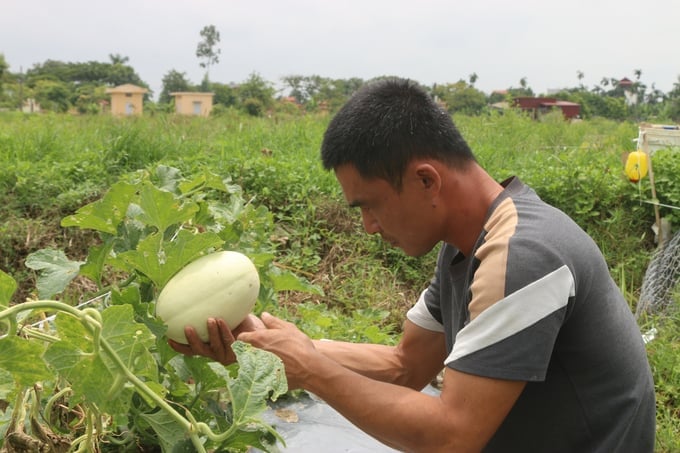
Organic agricultural products often exhibit unappealing appearances, posing challenges in market competition. Photo: Dinh Muoi.
Farmers are currently accustomed to traditional farming practices, with a focus on chemical fertilizers and pesticides. As a result, during the early stages of the transition to organic production, farmers encounter numerous challenges in terms of pest and disease control due to their persisting pressure. Consequently, farmers will need time to establish and restore the ecosystem.
The transition to organic production typically leads to a decrease in yields and an increase in labor costs, thereby inflating the total cost of the final product. Additionally, the majority of organic agricultural products exhibits unappealing appearances, with visible signs of pest damage, spots from diseases, resulting in a loss of the product's market value.
Secondly, the certified organic production area in Hai Phong city is limited and fragmented. There is a lack of special organic technical procedures tailored for individual product group. Moreover, training materials on organic farming are limited and not widely distributed.
Thirdly, communication and information dissemination regarding the benefits and roles of organic agriculture are not comprehensive. Namely, both farmers and consumers have limited knowledge regarding the benefits of organic products. Consequently, the demand for organic products is low, and their market lacks stability. Additionally, the majority of organic production businesses and households are heavily reliant on support projects for their investments.
Fourthly, the market suffers from the mixing of organic and non-organic products, including unsafe ones, which leads to a reduction in credibility. Furthermore, a significant portion of the population maintains an average income level, making the adoption of higher-priced organic products, which cost 25 to 30% more compared to regular products, less prevalent.
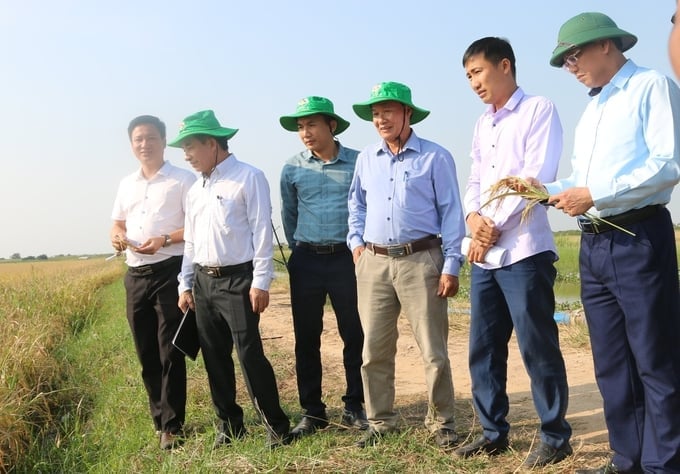
Head of Hai Phong city's Department of Agriculture and Rural Development inspecting an organic rice production model in Vinh Bao district. Photo: Dinh Muoi.
Ultimately, the development of organic agriculture requires the involvement of the entire political and social system, in combination with the guidance of the government in the planning process and policy implementation. Early completion and issuance of specific organic standards and regulations are essential, as well as supporting local governments in establishing organic agricultural production models. Most importantly, public awareness and education must be improved in order to ensure community health and contribute to sustainable environmental protection.
According to the city's plan, Hai Phong aims to establish 513 hectares of organic production area by 2025, which represents 1.36% of the total agricultural land. The value of organic agricultural products is expected to be 1.3 to 1.5 times higher compared to that of non-organic products. Notably, Hai Phong city's goals in 2023 include establishing economic and technical standards for the organic production of select crops such as rice, vegetables, and fruit trees. Furthermore, the city aims to acquire organic certification for 200 to 250 hectares of rice, vegetable, and fruit tree production area.
Translated by Nguyen Hai Long
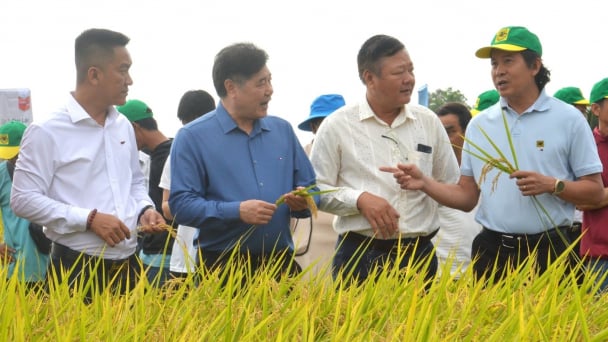
(VAN) The results from pilot fields are catalyzing the expansion of the One million hectares of high-quality, low-emission rice project in Kien Giang.
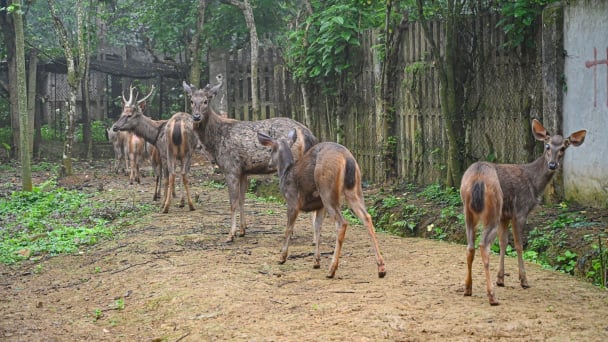
(VAN) On the morning of April 11, Cuc Phuong National Park received 18 individuals of endangered and rare wild animals from Da Nang city.
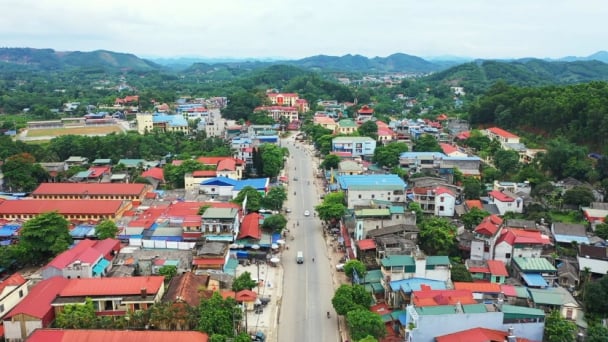
(VAN) FAO supports Vietnam in enhancing survey sampling techniques for the 2025 nationwide agricultural and rural census.

(VAN) By participating in the green transition, manufacturers become an indispensable part of the circular economy, contributing to resource optimization and environmental protection.
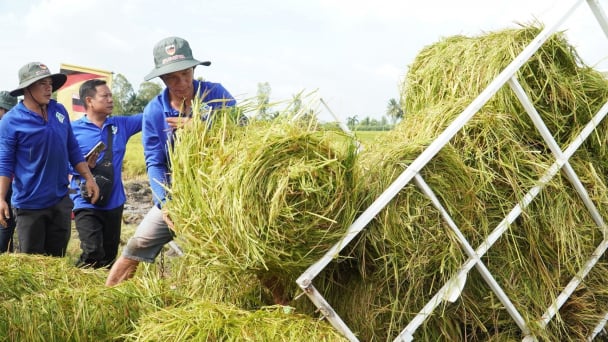
(VAN) The One Million Hectares of High-Quality and Low-Emission Rice Program can generate nearly 14 million tons of straw annually, posing an urgent requirement to diversify straw-based products.
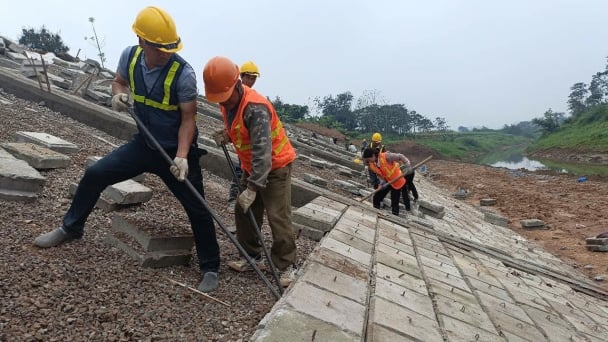
(VAN) This figure was recently announced at a conference held in Yen Bai, focusing on climate-resilient infrastructure development for ethnic minority regions.
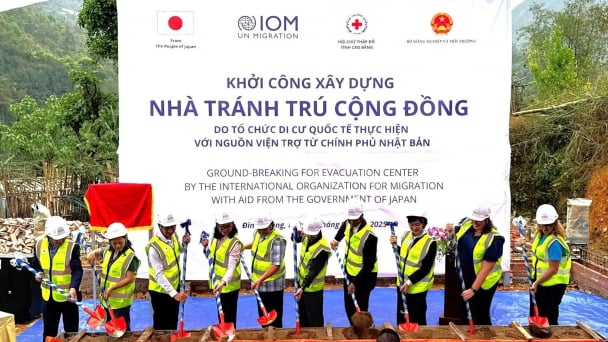
(VAN) The evacuation center is a practical work in efforts to respond to natural disasters and adapt to climate change in vulnerable areas.